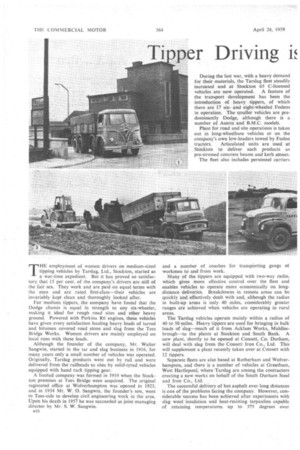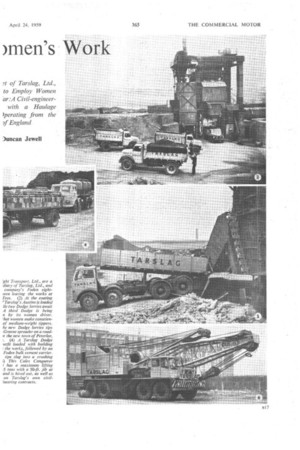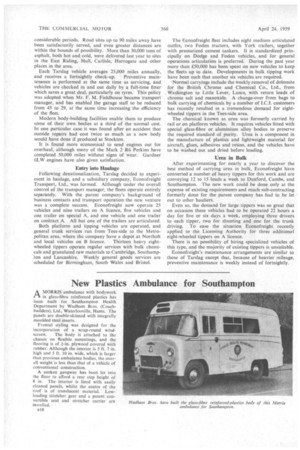Ti per Driving
Page 50

Page 51

Page 52

If you've noticed an error in this article please click here to report it so we can fix it.
.?t of Tarslag, Ltd., to Employ Women .ar:ACivil--engineer
with a Haulage )perating from the )f England )unean Jewell
THE: employment of women drivers on medium-sized tipping vehicles by Tarslag, Ltd., Stockton, started as a war-time expedient. But it has proved so satisfactory that 15 per cent, of the company's drivers are still of the fair sex. They work and are paid on equal terms with the men and are rated. first-class—their vehicles are invariably kept clean and thoroughly looked after.
For medium tippers, the company have found that the Dodge chassis is equal in strength to any six-wheeler, making it ideal for rough road sites and other heavy ground. Powered with Perkins R6 engines, these vehicles have given every satisfaction hauling heavy loads of tarred and bitumen covered road stone and slag from the Tees Bridge Works. Women drivers are mainly employed on local runs with these loads. , Although the founder of the company, Mr. Walter Sangwin, started in the tar and slag business in 1916, for many years only a small number of vehicles was operated. Originally, Tarslag products went out by rail and were delivered from the railheads to sites by solid-tyred vehicles equipped with hand rack tipping gear.
A limited company was formed in 1919 when the Stockton premises at Tees Bridge were acquired. The original registered office at Wolverhampton was 'Opened in 1923, and in 1934 Mr. W. D. Sangwin, the founder's .son, went to Tees-side to develop civil engineering work in the area. Upon his death in 1957 he was succeeded as joint managing director by Mr. S. W. Sangwin,
and a number of coaches for transpOrting gangs of workmen to and from work.
Many of the tippers are equipped with two-way radio, which gives more effective control over the fleet and enables vehicles to operate more economically on longdistance deliveries. Breakdowns in remote areas can be quickly and effectively dealt with and, although the radius in built-up areas is only 40 miles, considerably greater ranges are achieved when vehicles are operating in rural areas.
The Tarslag vehicles operate mainly within a radius of 40 to 50 miles. Heavy tippers are used for bringing in bulk loads of slag—much of it from Acklam Works, Middles. brough—to the plants at Stockton and South Bank. A new plant, shortly to be opened at Consett, Co. Durham, will deal with slag from the'Consett Iron Co., Ltd. This will supplement a plant recently taken over at ConSett with 12 tippers.
Separate fleets are also based at Rotherham and Wolverhampton, and there is a number of vehicles at Greatham, West Hartlepool; where Tarslag are among the contractors erecting a new.works on behalf of the South Durham Steel and Iron Co., Ltd.
The successful deliVery of hot asphalt over long distances is one of the problems facing the company. However, considerable success has been achieved after experiments with slag wool rinSulation sand heat-resisting tarpaulins capable of retaining temperatures up to 375 degrees over
considerable periods. Road sites up to 90 miles away have been satisfactorily served, and even greater distance S are within the bounds of.possibility. More than 30,000 tons of asphalt, both hot and cold, were delivered last year to sites in the East Riding, Hull, Carlisle, Harrogate and other places in the area. .
Each Tarslag vehicle averages 25,000 miles annually,
and receives a fortnightly check-up. Preventive maintenance is performed at the same time as servicing, and vehicles are checked in and out daily by a full-time fitter which saves a great deal, particularly on tyres. This policy was adopted when Mr. F. M. Fieldhouse became transport manager, and has enabled the garage staff to be reduced from 45 to 29, at the same time increasing the efficiency of the fleet.
Modern body-building facilities enable them to produce some of their own bodies at a third of the normal cost. In one particular case it was found after an accident that outside repairs had cost twice as much as a new body would have done if produced at Stockton.
It is found more economical to send engines out for overhaul, although many of the Mark 2 R6 Perkins have completed 50,000 miles without signs of wear. Gardner 6LW engines have also given satisfaction.
Entry into Haulage Following denationalization, Tarslag decided to experiment in haulage, and a subsidiary company, Econofreight Transport, Ltd., was formed. Although under the overall control of the transport manager, the fleets operate entirely separately. With the parent company's background of business contacts and transport operation-the new venture was a complete success. Econofreight now operate 25 vehicles and nine trailers on A licence, five vehicles and one trailer on special A, and one vehicle and one trailer on contract A. All but one of the trailers are articulated.
Both platform and tipping vehicles are operated, and general trunk services run from Tees-side to the Metropolitan area, where the company have a depot at. Northolt and local vehicles on B licence. Thirteen heavy eightwheeled tippers operate regular services with bulk chemicals and granulated raw materials to Cambridge. Southampton and Lancashire. Weekly general goods services are scheduled for Birmingham, South Wales and Bristol.
The Econofreight fleet includes eight medium articulated outfits, two Foden tractors, with York trailers, together with pressurized cement tankers. It is standardized principally on Dodge and Foden vehicles, and for general operations articulation is preferred. During the past year more than £50,000 has been spent on new vehicles to keep the fleets up to date. Developments in bulk tipping work have been such that another six vehicles are required.
Normal carryings include the weekly removal of dolomite for the British Chrome and Chemical Co., Ltd., from Washington to Little Lever, Lanes, with return loads of chrome salt and manoxide. A change-over from bags to bulk carrying of chemicals by a number of customers has recently resulted in a tremendous demand for eightwheeled tippers in the Tees-side area.
The chemical known as urea was formerly carried by rail or on platform vehicles. It requires vehicles fitted with special glass-fibre or aluminium alloy bodies to preserve the required standard of purity. Urea is a component in the manufacture of plastics and lightweight material for aircraft, glues, adhesives and resins, and the vehicles have to be washed out and dried before loading.
Urea in Bulk After experimenting for nearly a year to discover the best Method of carrying urea in bulk, Econofreight have converted a number of heavy tippers for this work and are conveying 12 to 15 loads a week to Duxford, Canals, and Southampton. The new work could be done only at the expense of existing requirements and much sub-contracting formerly done for the parent company has had to be let out to other hauliers.
Even so, the demand for large tippers was so great that on occasion these vehicles had to be operated 22 hours a day for five or six days a week, employing three drivers to each tipper, two for shunting and one for the trunk driving. To ease the situation Econofreight recently applied to the Licensing Authority for three additional eight-wheeled tippers on A licence.
There is no possibility of hiring specialized vehicles of this type, and the majority of existing tippers is unsuitable.
Econofreight's maintenance arrangements are similar to those of Tarslag except that, because of heavier mileage, preventive maintenance is weekly instead of fortnightly.




































































































